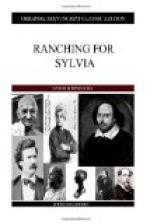“‘Does she know you have come to me about it?’ I said.
“‘Can’t say,’ he told me coolly, with a cigarette hanging out of his mouth. ’I haven’t mentioned the matter yet; I thought I’d ask you first.’
“‘S’pose I object?’ I said.
“‘Then,’ he allowed quite tranquil, ’the thing will have to be considered. There’s not the slightest reason why you should object.’
“I’d a notion I could agree with him—I liked the way he talked—and I told him Helen could go, but the next time he called he was to walk right into the office instead of hanging round the counter. I asked him what he’d done with all the canned truck he’d bought, and he said he was inclined to think his partner had eaten most of it. Since then he’s been over pretty often, and I figured it was time I gave you a hint.”
“Thanks,” responded George. “He was, in a way, placed in my hands, but I’ve no real control over him.”
“That’s so; he’s of age. What I felt was this—I’ve nothing against West, but my girl’s good enough for anybody, and I can’t have his people in England looking down on her and making trouble. If they’re not satisfied, they had better call him back right now. There’s to be no high-toned condescension in this matter.”
“I don’t think you need be afraid of that,” said George. “It would be altogether uncalled for. It’s very likely that I shall be consulted, and I’ll have pleasure in telling his people that I consider him a lucky man.”
“There’s another point—has West any means?”
“I believe about five thousand dollars could be raised to put him on a farm.”
Taunton nodded.
“It’s not very much, but I don’t know that I’m sorry. I’ll see they’re fixed right; whatever West gets I’ll beat. My girl shan’t be indebted to her husband’s folks. But there’s not a word to be said about this yet. West must wait another year before we decide on anything.”
George thought the storekeeper’s attitude could not be found fault with, and when he drove home through the soft dusk of the summer night, he was glad to feel that there was no need for anxiety about the choice Edgar had made.
CHAPTER XXVIII
THE LEADING WITNESS
Three or four weeks passed quietly without any news from Flett until one evening when Edgar sat talking to Miss Taunton in the office of her father’s store at Sage Butte. The little, dusty room was unpleasantly hot and filled with the smell of resinous pine boards; there was a drawl of voices and an occasional patter of footsteps outside the door; and a big book, which seemed to have no claim on her attention, lay open on the table in front of the girl.
She was listening to Edgar with a smile in her eyes, and looking, so he thought, remarkably attractive in her light summer dress which left her pretty, round arms uncovered to the elbow and displayed the polished whiteness of her neck. He was expressing his approval of the current fashions, which he said were rational and particularly becoming to people with skins like ivory. Indeed, he was so engrossed in his subject that he did not hear footsteps approaching until his companion flashed a warning glance at him; and he swung round with some annoyance as the door opened.




